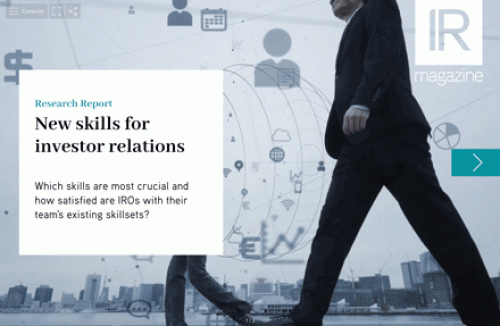Corporate memberships among measures being considered in strategic shake-up by IR association
The NIRI board may introduce corporate memberships as part of a strategic plan to be implemented next year.
This would be in contrast to the current individual membership on offer, which follows IROs and counselors for the term of membership, even when they leave their employer and move to another job.
‘The membership fee structure has been in place for some years,’ says NIRI CEO and president Jeff Morgan. ‘We’re willing to say that having a corporate membership will work better in the current climate.’
While the strategic plan is still in draft form, Morgan was willing to discus some of the issues it addresses before the board votes to approve it at the association’s November annual meeting.
The plan has received input from more than 500 NIRI members, including past NIRI board chairs and current chapter leaders.
National focus
Despite clear evidence that the financial markets are migrating to one integrated global environment, NIRI intends to remain a national association, Morgan insists.
NIRI will keep its focus on its US corporate and counselor membership and the strategic plan is not calling for the organization to extend its footprint overseas, which Morgan implies might antagonize other IR organizations.
‘I think the US has a pretty good model for investor relations,’ he says. ‘We see things before other countries do. We can work with global partners so IR develops in a fashion where everybody is basically doing the same thing.
‘As IR has become globalized and capital markets change, we want to be leaders. When you start creating chapters and entities overseas, there’s a lot that goes with that. At this point we need to stick to our bread and butter, focusing on the practice and education. It makes sense, if we are going to serve a global purpose without stepping on toes.’
NACD's Directorship 100
Morgan was recently named to the National Association of Corporate Directors’ 2011 Directorship 100 in recognition of his work promoting corporate governance. He says the recognition ‘reaffirms… that IR does have a role in corporate governance.’
Citing the recent mandatory say-on-pay votes at most companies, Morgan says the proxy season demonstrated that ‘if a company focuses on communicating its message, meets with investors and does disclosure right, it can have a pretty smooth process.’
He says he expects the upcoming proxy season to focus on the enhanced compensation disclosures, comparing CEO pay with median employee compensation and stock price performance.
‘That’s going to fuel a lot of conversation between CNBC, activist investors and the average investor asking, What does this mean?’ he states.










